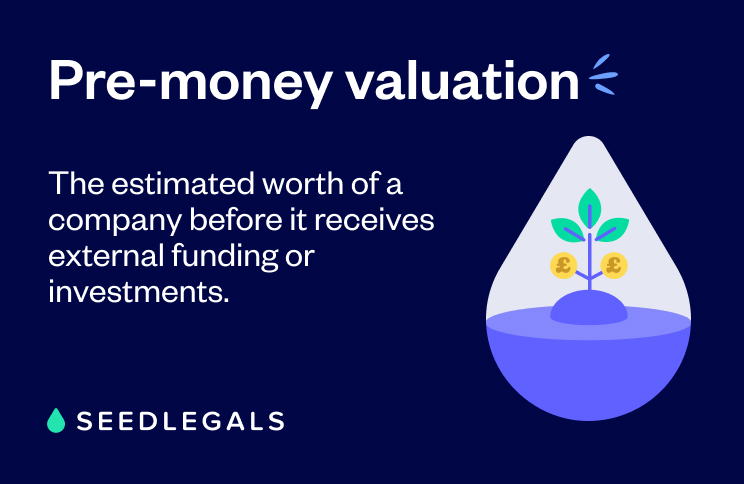How to value a pre-revenue company and what metrics to show investors
For any company, it’s never easy to land on a valuation figure. And when your company is early stage, and especially whe...
Your pre-money valuation is an important metric for understanding how much equity to give in exchange for capital. In this article, we’ll explain what a pre-money valuation is, highlight the key factors that influence it and discuss how it’s different from pre-revenue valuation.
Contents:
Pre-money valuation is just one way of talking about the overall company valuation.
Valuation is a measure of how much a company is worth, and for both you and your investors, it’s an important figure to know.
Your valuation helps investors gauge the attractiveness of the investment opportunity in your company – ie, understand what their ROI could look like. It also helps you understand how your ownership stake as a founder will be affected by equity investment.
An investor puts money into a company in exchange for a proportional amount of equity. For the investor, a lower valuation is more cost-effective because they can own more equity for a lower buy-in. Conversely, as a founder you want to be able to sell less equity at a higher value.
All the same, you don’t want an overly inflated valuation of your startup. While a higher valuation means more seed capital without giving away more equity, if you raise expectations with a huge number and don’t deliver, you might have to drop your valuation at your next round. This is a problem for several reasons, not least because it gives a terrible impression to prospective new investors and dilutes your current investors more than they had bargained for.
Pre-money valuation is the estimated worth of a company before the company receives external funding or investments.
The pre-money valuation reflects the company’s value in its current state, without factoring in any additional investment capital. This valuation is a key metric used by investors to determine how much ownership they’ll receive in exchange for their investment.
A clear pre-money valuation:
Post-money valuation refers to how much your company will be worth after an investment.
Example:
UnicornTech has a valuation of £1 million before they’ve received any investment capital. This is the pre-money valuation. UnicornTech then receives £500,000 equity investment from an investor. The value of the company is now £1.5 million. This is the post-money valuation (£1 million pre-money valuation + £500,000 investment). To calculate the price per share of your round, divide your pre-money valuation by the number of shares you have in the company before the raise.
When you’re negotiating an investment deal, you and your investors must be clear on whether you’re talking about pre-money valuation or post-money valuation in your Term Sheet. If you’re talking post-money valuation while your investor’s talking pre-money valuation, your investor will come away with a lot more equity than you bargained for. The pre-money valuation will be lower, meaning the investor will get more equity for their money.
In the UK, it’s common practice to discuss your valuation in terms of pre-money. This is because the post-money valuation changes as the investment amount changes.
You might have heard of pre-revenue valuation. It’s different from pre-money valuation. Pre-revenue valuation is the worth of your company before the company has made any money (ie revenue) from your product or service.
So what are the factors that influence the value of your company? It’s a tricky one, and can never be 100% accurate, but here are some guidelines on what affects your valuation:
Jonny SeamanNo two startups are the same, so landing on a fair valuation is usually a big negotiation point between founders and investors. The key is to be able to justify your valuation based on the core factors mentioned above. Benchmarking your valuation against other companies in your industry is also important to ensure you’ve landed on a reasonable and substantiated number.
Investor Partnerships Manager,
Raising startup funding? We can simplify your journey and help you save time and money on legal costs. Book a free call below to chat with one of our experts.








